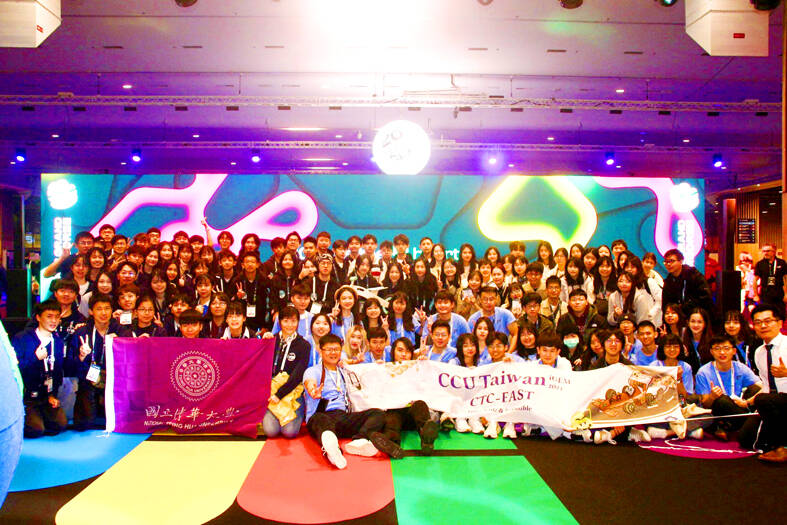Industry experts have called for more support for Taiwan’s synthetic biology sector after Taiwanese teams won six gold medals at the International Genetically Engineered Machine (iGEM) competition in Paris last week.
Teams from Taiwan won six gold medals, four silver medals and several other prizes at the competition, which focuses on synthetic biology development and was held from Thursday to Sunday last week.
Taipei-KCISLK-V1, comprised of students from Kang Chiao International School’s Linkou Campus, won a gold medal for their project “Worm Out Clots,” which addressed cardiovascular disease, one of the top three causes of death in Taiwan last year.

Photo courtesy of GEMS-Taiwan via CNA
The team used synthetic biology to create a probiotic platform for the automatic in vivo production of the enzyme lumbrokinase, which can dissolve blood clots.
The platform would prevent the mass killing of earthworms to produce the protein and enable it to be delivered as prescribed, the team said.
National Tsing Hua University won gold for “NanoCircDx,” a diagnostic technology platform for cancer screening using liquid biopsies.
The platform seeks to determine the potential presence of colorectal cancer through circular RNA analysis in blood samples, the team said.
Laurent Hsia (夏啟鐸), who has served as an iGEM judge, said that synthetic biology could solve several issues in medicine, as demonstrated by the award-winning projects.
Yet despite those successes, more resources are needed to boost students’ knowledge and passion for the subject, Hsia said.
Chiang Ju-yi (江如意), an adviser for Taipei-KCISLK-V1, said that a lack of resources for synthetic biology is reflected in it being only mentioned in one chapter of biology textbooks for high-school students.
Huang Chieh-chen (黃介辰), a professor in National Chung Hsing University’s Department of Life Sciences, said that synthetic biology is not well known in Taiwan, and that he hoped universities could recruit more instructors and launch new courses to help develop the field.
Injecting more resources into the sector would help specialists promote their work, experts in the field said.
Yu Chun-ying (余俊穎), an assistant professor of biomedical sciences at National Chung Cheng University (NCCU), who has long mentored the university’s iGEM teams, said that more resources would help competition winners promote their work abroad.
For example, they would be better able to seek international collaborations with the help of overseas Taiwanese chambers of commerce, which would nurture talent in the industry and bolster Taiwan’s capabilities to meet international standards, Yu said.
At this year’s iGEM, an NCCU team won a gold medal with their project “CTC-FAST: How we fight against lung cancer.”
The team created a device to detect circulating tumor cells, to make the process more accessible and affordable, improve postoperative follow-up care and reduce deaths, the team said.
Meanwhile, Wu Ming-tsung (吳明璁), a cofounder of biotechnology company Genenet Technology and secretary-general of the UK Taiwanese Chamber of Commerce, agreed that additional resources could go a long way in the field.
“Taiwan is rich in talent and has a first-class R&D [research and development] environment, and well-developed semiconductor and medical device industrial chains,” he said.
“If a more efficient platform can be established between our representative offices and chambers of commerce, we can plan suitable, timely policy responses to international trends, and help bridge the gap between those trends and domestic talent and industries, minimizing brain drain,” he said.

Taipei has once again made it to the top 100 in Oxford Economics’ Global Cities Index 2025 report, moving up five places from last year to 60. The annual index, which was published last month, evaluated 1,000 of the most populated metropolises based on five indices — economics, human capital, quality of life, environment and governance. New York maintained its top spot this year, placing first in the economics index thanks to the strength of its vibrant financial industry and economic stability. Taipei ranked 263rd in economics, 44th in human capital, 15th in quality of life, 284th for environment and 75th in governance,

Greenpeace yesterday said that it is to appeal a decision last month by the Taipei High Administrative Court to dismiss its 2021 lawsuit against the Ministry of Economic Affairs over “loose” regulations governing major corporate electricity consumers. The climate-related lawsuit — the first of its kind in Taiwan — sought to require the government to enforce higher green energy thresholds on major corporations to reduce emissions in light of climate change and an uptick in extreme weather. The suit, filed by Greenpeace East Asia, the Environmental Jurists Association and four individual plaintiffs, was dismissed on May 8 following four years of litigation. The

A former officer in China’s People’s Liberation Army (PLA) who witnessed the aftermath of the 1989 Tiananmen Square massacre has warned that Taiwan could face a similar fate if China attempts to unify the country by force. Li Xiaoming (李曉明), who was deployed to Beijing as a junior officer during the crackdown, said Taiwanese people should study the massacre carefully, because it offers a glimpse of what Beijing is willing to do to suppress dissent. “What happened in Tiananmen Square could happen in Taiwan too,” Li told CNA in a May 22 interview, ahead of the massacre’s 36th anniversary. “If Taiwanese students or

The New Taipei City Government would assist relatives of those killed or injured in last month’s car-ramming incident in Sansia District (三峽) to secure compensation, Mayor Hou You-yi (侯友宜) said yesterday, two days after the driver died in a hospital. “The city government will do its best to help the relatives of the car crash incident seek compensation,” Hou said. The mayor also said that the city’s Legal Affairs, Education and Social Welfare departments have established a joint mechanism to “provide coordinated assistance” to victims and their families. Three people were killed and 12 injured when a car plowed into schoolchildren and their